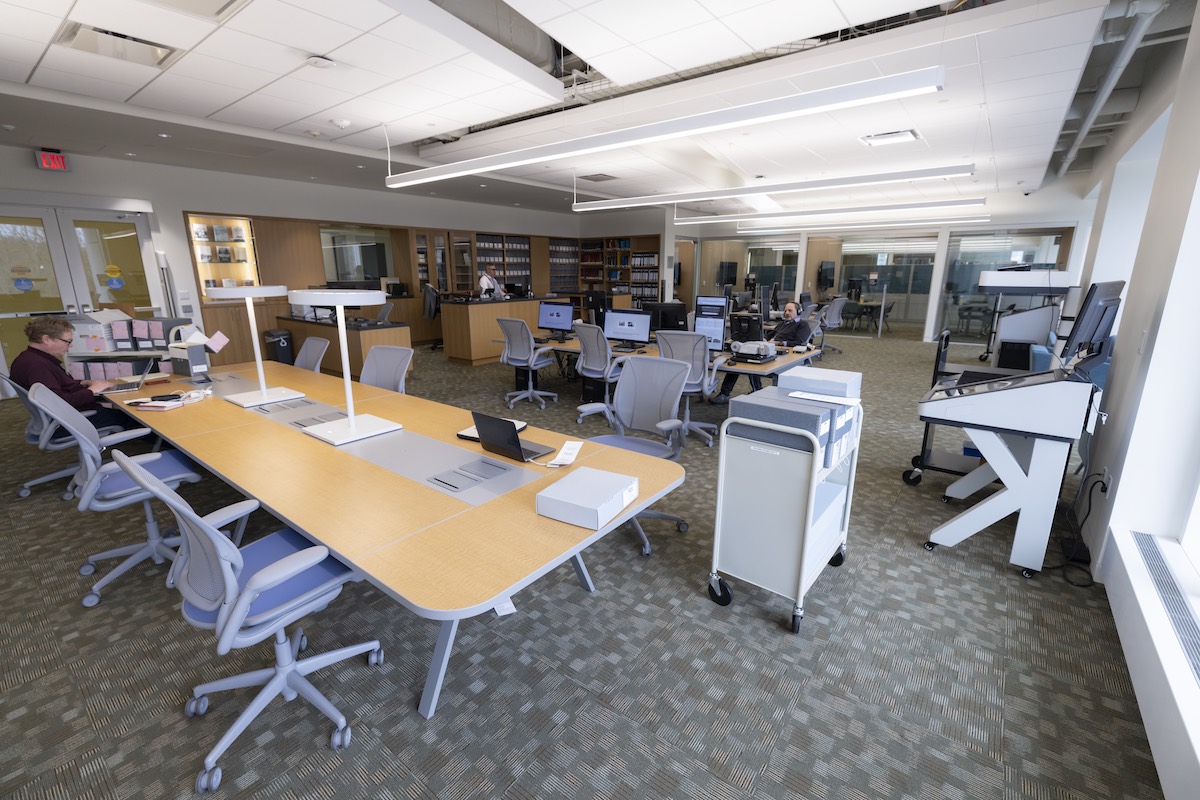On This Page
Planning a Research Visit
Before You Arrive
During Your Visit
After Your Visit
How to Conduct Research at the Shapell Center
The Museum’s David M. Rubenstein National Institute for Holocaust Documentation acquires, preserves, and makes accessible the historical record of the Holocaust and supports the Museum’s wide-ranging efforts in the areas of research, exhibition, publication, education, and memorialization.
Many materials are digitally available through the Museum's Collections Search. In addition to online resources, members of the public may access archival and published resources at the David and Fela Shapell Family Collections, Conservation and Research Center in Bowie, Maryland. On this page you will learn about how to plan your visit and prepare for conducting on-site research at the Shapell Center.
In addition to the services at the Shapell Center, the Museum’s Holocaust Survivors and Victims Resource Center staff provides free research and reference services about the fate of individuals virtually and on the Second Floor of the Museum building in Washington, D.C. to help researchers seeking documentation about individual survivors and victims.

Read all information on this page carefully before making your appointment. All researchers must register and make an appointment in advance.
Need Help?
Guidelines for Accessing Materials for In-Person Research
Pre-order Research Materials
To help ensure a successful research visit, you must pre-order all of your research materials.
Archival and Published Resources
For archival and published resources, including digitized materials that are not available online, you will need to make an appointment for the Shapell Center reading room at least seven days prior to your visit.
Objects and Material Culture
For objects, including artwork, textiles, and other examples of material culture, please contact the reference desk as far in advance as possible, no later than 21 days prior to your visit. Please note that fulfilling requests to view objects is dependent upon staff and space availability, as all viewing requires staff presence.
Inaccessible Materials
Although we make every effort to make all Museum materials available, there may be factors, including the the fragile nature of certain artifacts or collections, or whether the materials are on loan, on exhibit or being prepared for conservation treatment or digitization, that may require us to find alternate ways to assist with your requests.
Remotely Accessible Resources
The Museum provides global access to hundreds of thousands of original archival and published resources as well as other materials documenting the Holocaust. If you are interested in remote research assistance, or cannot visit the Shapell Center, please consult our online research tools and then contact the reference desk for assistance if needed.
Hours and Appointments
All research visitors to the Shapell Center must first register in the Collections Request system and agree to abide by the Museum’s Terms of Use. All research visitors to the Shapell Center are required to make an appointment or other arrangements in advance. Due to space constraints, guests of researchers who have not made an advance appointment may not be able to secure a research seat. Given the quiet research environment of the reading room and the sensitive nature of our holdings, researchers are advised not to bring young children.
For Archival and Published Materials
The Shapell Center reading room is open to the public, by appointment, Monday through Friday, 10 a.m. to 5 p.m. Access is not available on Federal holidays and Yom Kippur. Appointments must be made at least seven days before your visit and can be made up to 90 days in advance. Researchers can make appointments for morning (10 a.m. to 1 p.m.) and/or afternoon (2 p.m. to 5 p.m.) research sessions. Visitors wishing to stay the whole day are required to reserve both morning and afternoon sessions. The reading room is open through the midday period for researchers who have reservations in both sessions.
A limited number of seats are available for each research session, and appointments may fill up quickly. All visitors, including guests accompanying researchers, should make an appointment in the system to ensure access. Due to space constraints, guests of researchers who have not made an appointment may not be able to secure a research seat. Researchers are encouraged to contact the reference desk for assistance.
Viewing Material Culture including Objects, Artwork, and Textiles
Access to these types of materials will be contingent on staff capacity, the fragility of the requested materials, and other factors. Such materials can only be examined in the Collections Services Suites under the supervision of authorized Museum staff. Researchers must contact us no later than 21 days prior to their intended research visit. Please note there may be factors such as the fragile nature of certain artifacts that may prevent us from making some items available to visitors. Object access requires staff handling and supervision for the entirety of the visit.
Requests to view material culture items that arrive with less than 21 days notice will not be honored.
For Audiovisual, Magnetic Media, Motion-picture Film, and Sound Materials
Due to the fragile nature of archival audiovisual and magnetic media on physical carriers, such as reel-to-reel tapes, diskettes, motion picture film, sound records or videocassettes, this material cannot be viewed in the reading room. The Museum is working to digitize this material for preservation and access. Please contact the reference desk with any questions about whether and how audiovisual material may be available.
* The reading room on the fifth floor of the Museum remains closed to the public until further notice.
Before You Arrive
Researcher Registration
Researchers must complete the researcher registration process prior to creating an appointment. To help ensure a positive research experience, please make appointments and contact us with any questions or requests as far in advance of your planned visit as possible. Researchers planning to use archival or published materials in the Shapell Center reading room should review the reading room policies prior to making an appointment.
More information to help you plan your visit, including detailed information about transportation options to the Shapell Center, will be provided after registration.
Search Online and Request Materials
The Museum’s online catalog provides access to many digitized collections. Due to the fragile nature of many Museum collections, please use digital copies of collections, or images of artifacts, wherever possible rather than requesting access to original materials.
- Ordering archival and published materials: For archival and published materials, you can request collections or publications directly from the online catalog. A reference librarian will assist you with this process once your appointment has been confirmed.
- Requests to see objects and artifacts: To view objects, artwork, textiles, and other examples of material culture, contact the reference desk as far in advance as possible, but no later than 21 days prior to your planned visit. Please note that a Shapell Center reading room appointment does not guarantee access to this material.
- Accessing legally restricted materials: Some materials may have legal access or use restrictions that require you to make advance arrangements with a third party, such as another institution that provided copies of materials to the Museum, before you are able to see these collections. These restrictions are described in the online catalog records for each collection.
Transportation and Building Access
- Location: Once you have a confirmed appointment, instructions for accessing the Shapell Center will be provided.
- Identification: Government issued photo identification is required to access the Shapell Center. You will be denied access without proper identification.
- Parking: Street parking is available. Researchers requiring accessible parking should contact the reference team prior to their visit.
- Shuttle Service: The Museum provides one morning shuttle from the New Carrollton transit station in time for the opening of the reading room. A shuttle departs the Shapell Center for the New Carrollton station shortly after the reading room closes for the day. Researchers with confirmed research appointments will be provided with instructions for reserving a seat on the shuttle.
During Your Visit
Shapell Center Amenities
- Facilities: The Museum provides lockers for personal belongings. Refrigerators, microwaves, and vending machines are available in a lunch and break room. Visitors should bring their own food as dining options near the Shapell Center are limited. Food and drinks may not be consumed in the reading room or near Museum collection materials.
- Copying, Scanning, and Wi-Fi Options: Personal laptop computers and cameras are welcome in the reading room.
- A wi-fi network is available throughout the Shapell Center for researcher use.
- For researchers consulting archival and published materials in the Shapell Center Reading Room, all microform stations are enabled with scanners that create digital copies of materials
- Self-service scanning stations are available for use with archival and published paper-based materials.
- The Museum will provide free portable USB storage devices for patrons.
- For visitors who have arranged to view objects in the Collections Services Suites, photography of artifacts for non-commercial use is permitted. However, the use of monopods, tripods, studio lights, light boxes, or other such equipment, is not permitted.
- Health and Safety Precautions: All relevant guidelines from the Museum’s Visitor Guidelines and Safety Measures apply to the Shapell Center.
Circulation and Interlibrary Loan
To help preserve the evidence of the Holocaust, Museum collections that have not been digitized are available only for on-site research in the reading room. Consequently, published materials as well as Museum archival holdings and microfilms do not circulate to the public, nor can they be loaned via interlibrary loan. Please contact your local librarian to determine another source for the published items you are seeking if we do not have them.
Research about Individual Survivors and Victims
There is no single list of Holocaust victims or survivors; tracing an individual through the Holocaust is a process of piecing together bits of information from a variety of sources. Those planning to undertake family history research at the Shapell Center Reading Room should note that the name of the town where an individual lived prior to the war is often invaluable in identifying the resources in the Museum’s collections that they will want to see while they are at the Shapell Center.
The Museum’s Holocaust Survivors and Victims Resource Center staff provides free research and reference services virtually and on the Second Floor of the Museum building in Washington, D.C. to help researchers seeking documentation about individual survivors and victims. Priority is given to survivors, their families, and the families of victims.
To learn more about the Resource Center, including hours of operation, please see the Resources on Survivors and Victims page.
After Your Visit
How to Cite Museum Resources
To assist researchers in providing appropriate and adequate references and citations to Museum materials reviewed by researchers, we have created a detailed page of guidance on citations.





